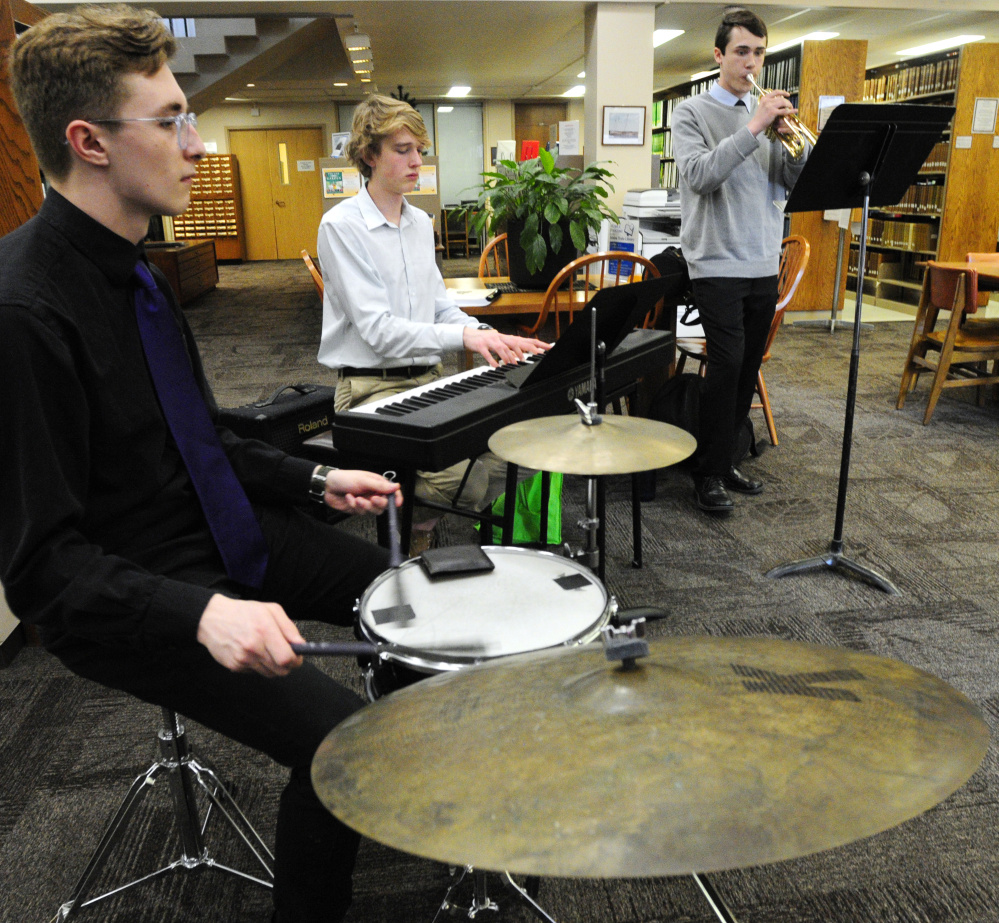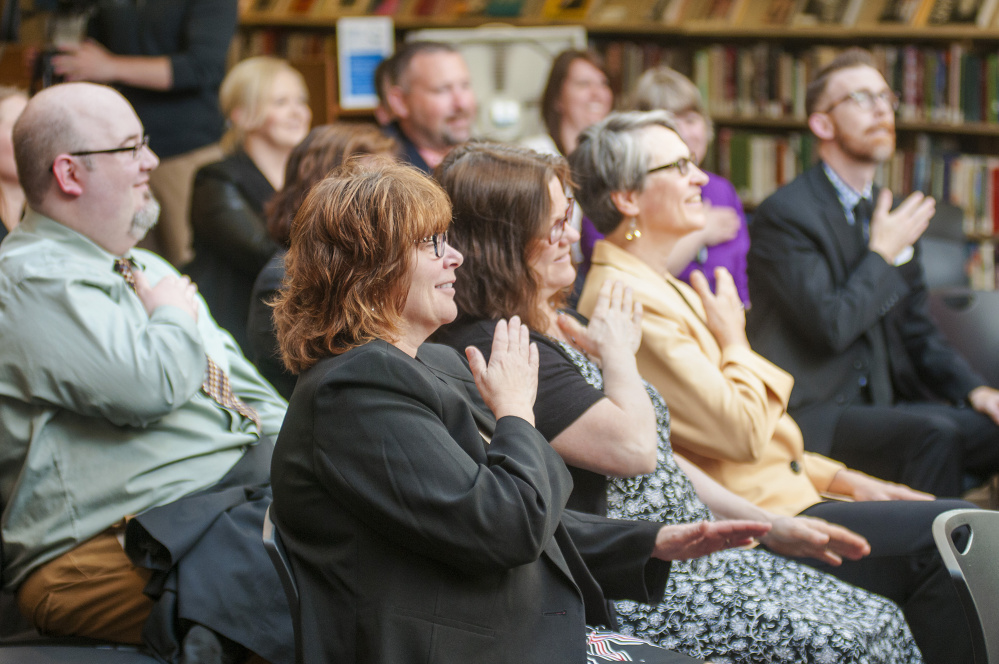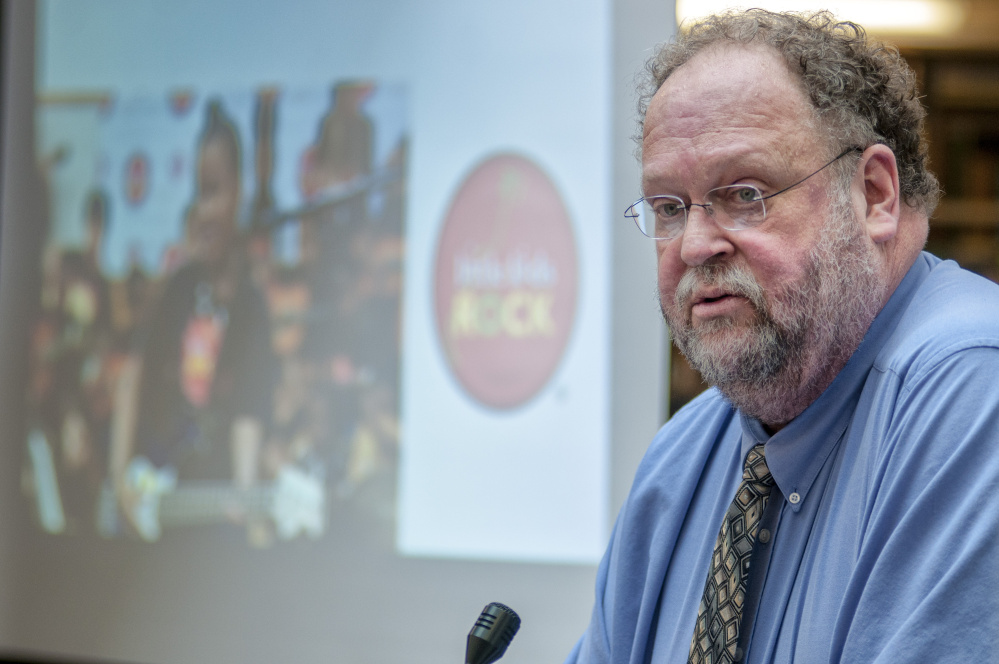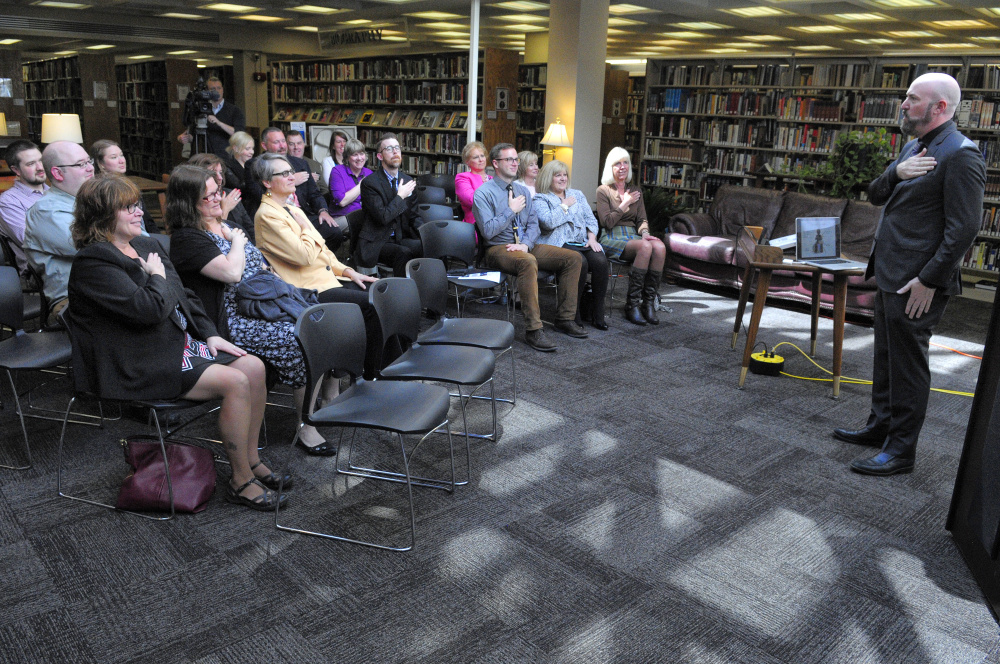AUGUSTA — Scott Burstein said music saved his life and turned him from a troubled kid into the person he is today. His goal is to make sure students at Waterville Senior High School and throughout Maine have the same access to music education he did, he said, because it can be a lifesaver.
Burstein shared his vision for the collaboration between the Maine Department of Education and Little Kids Rock during a presentation Wednesday morning at the Maine State Library.
Little Kids Rock is a national nonprofit whose mission is to build a world where children can live rich, purposeful lives by ensuring that all public school children have the opportunity to unlock their inner music makers. This collaboration is the first time the organization has partnered with a state department of education.
“This is about investment and an early age and making the investment to ensure that every student is receiving music and art classes they can build on,” said Beth Lambert, visual and performing arts specialist at the Maine DOE.
As part of the 2017-2018 Maine Kids Rock pilot program, 10 schools, including Waterville, will receive $5,000 worth of musical instruments as part of the program’s $50,000 investment in Maine. The intent of the pilot program is to expand and innovate current music programs throughout Maine. To be eligible for the pilot, school districts must have enrollments in which 50 percent or more of the students are eligible for free or reduced-price lunch, and they must agree to offer modern band during the 2017-2018 school year, taught by a certified music teachers, according to the state education department.
Sue Barre, president of the Maine Music Educators Association and a teacher at Waterville, said teachers will be trained to offer classes using modern band methods and materials. Teachers will use methods rooted in children’s knowledge of popular music forms including rock, pop, blues, hip-hop, country, reggae and R&B.
A three-piece band from Waterville performed before and after the event, and Adan Lawlor, a junior, said via email that music education has shaped who he is as a musician and person.
“It’s given me the opportunity for a lot of personal growth as a musician, and I’m gradually getting better at reading music,” Lawlor said. “It’s also given me a lot of confidence, especially when standing up in front of people to play music.”
Senior Spencer Jones said music education has helped him become a leader.
“It’s forced me to step up and lead after older band mates have graduated and moved on,” he said. “When you’re leading, you can’t just hide behind someone else, and I don’t know if I would’ve stepped up as a leader (without music education).”
Barre said that for years, some teachers have expressed fear that music is just “lost instruction time,” but she said those fears are unfounded.
According to a handout from the state education department, children who play a musical instrument are 52 percent more likely to go to college, and children who study music tend to have larger vocabularies and more advanced reading skills than their peers who do not participate in music lessons.
“Music does influence and impact a student’s learning and success,” Barre said. “It must be for everyone and it should be made available to all students in all schools.”
In Maine, every school district offers some sort of music education, but there aren’t music programs in every school and there aren’t any sequential music offerings from kindergarten through 12th grade. Lambert said the state must look at offering more at an early age.
“(The younger age) is when they can get engagement and a personal connection to music,” Lambert said. “They develop a relationship with their instrument that they can grow with, and if we only focus on high school, when they’re already deficient, then we’ve missed that boat.”
Burstein — before he led the group of music teachers and school administrators in a human drumming activity — said the nonprofit currently has 312,000 students enrolled in classes with about 2,000 trained teachers across 26 states, including Maine. The organization’s goal is to reach 1 million students by 2020, because he hopes once children are exposed to music and music education, they’ll be hooked.
He grew up outside Los Angeles and was exposed to music at a young age. Burstein, the nonprofit’s director of teaching and learning, first got paid as a musician before he graduated from high school and has been a music educator for more than two decades.
During the recession, Burstein said, many art programs were cut at public schools across the country, though some have started to come back. He said the question people have to answer is why music is important to teach during school.
Music education is more than just learning music, Burstein said. It’s about learning how to get along with other people, discipline, communication and creativity.
“To me, education is the concept of teaching people to better people, and nobody can learn anything if they’re not excited about it,” he said. “Music was that thing that made me excited and made me learn to be a better person.”
Schools selected for the program are Central Community Elementary School in Corinth, RSU 64; Crescent Park (Bethel) and Woodstock Elementary Schools, RSU 44; East End Community School, Portland Public Schools; Houlton Middle/High School, RSU 29; Katahdin Elementary, Middle and High Schools (Stacyville), RSU 50; Medway Middle School, Medway School Department; Meroby (Mexico) and Rumford Elementary Schools, RSU 10; Penobscot Valley High School (Howland), RSU 31; Troy Howard Middle School (Belfast), RSU 71; and Waterville Senior High School, AOS 92.
Jason Pafundi — 621-5663
Twitter: @jasonpafundiKJ
Send questions/comments to the editors.







Success. Please wait for the page to reload. If the page does not reload within 5 seconds, please refresh the page.
Enter your email and password to access comments.
Hi, to comment on stories you must . This profile is in addition to your subscription and website login.
Already have a commenting profile? .
Invalid username/password.
Please check your email to confirm and complete your registration.
Only subscribers are eligible to post comments. Please subscribe or login first for digital access. Here’s why.
Use the form below to reset your password. When you've submitted your account email, we will send an email with a reset code.